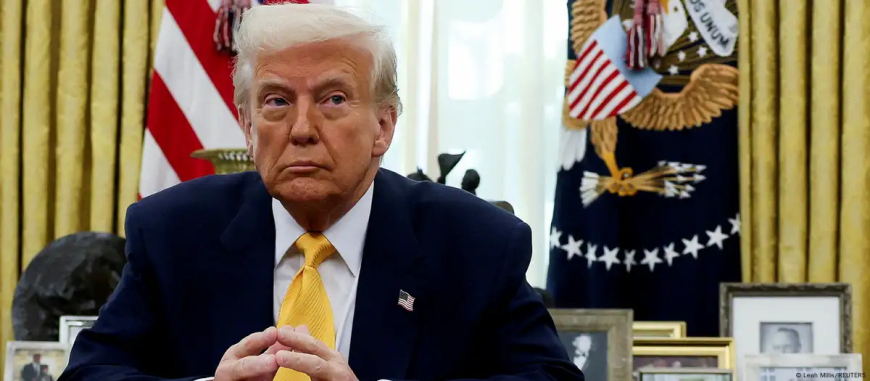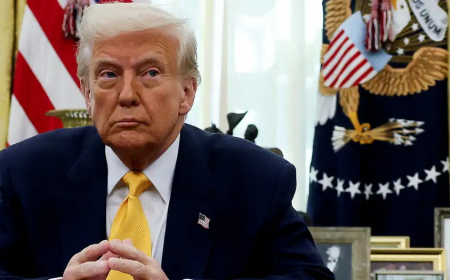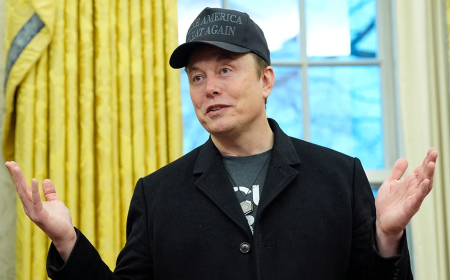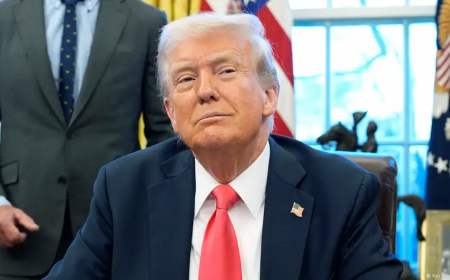US: Trump expected to announce sweeping global tariffs
On what he has dubbed "Liberation Day," US President Donald Trump is set to impose sweeping new reciprocal tariffs on many countries, the details of which are still unknown.

Canada's auto sector is tightly linked with US carmakers. Donald Trump's latest move to slap a 25% tariff on auto parts imported from the US neighbor is leaving suppliers scrambling to adapt amid rising uncertainty.
European markets down ahead of Trump announcement
European stocks closed lower on Wednesday as investors waited for US President Donald Trump's tariff plans to be made known.
The continent's benchmark STOXX Europe 600 index closed 0.5% lower. Germany's DAX fell 0.7%.
It's been a volatile week in European markets ahead of Trump's so-called "Liberation Day" announcement.
Wall Street broker Goldman Sachs cut its 12-month forecasts for the STOXX Europe 600, citing Trump's expected plans.
The index has been circling two-month lows and is about 5.1% below its all-time high hit in March.
European Central Bank head Christine Lagarde has warned that Trump's tariffs would be harmful "the world over."
Mexico not seeking 'tit-for-tat' tariffs
Mexican President Claudia Sheinbaum said she wasn't looking to get into a tit-for-tat tariff spat with the US ahead of President Donald Trump's announcement.
Trump is expected to announce a raft of sweeping new reciprocal tariffs aimed at reducing trade deficits and boosting domestic manufacturing. US neighbors Canada and Mexico are among the countries that could be levied.
Sheinbaum said at her daily morning press conference that Mexico will on Thursday "announce a comprehensive program, not a tit-for-tat on tariffs."
Adopting a wait-and-see approach, Sheinbaum said that whatever the outcome of Wednesday's announcement, there was a plan in place.
"Let's see what announcement they make, but we have a plan to strengthen the economy under any circumstance," Sheinbaum added.
EU says response to Trump tariffs will come at appropriate time
The European Union's response to US President Donald Trump's plan to impose broad new reciprocal tariffs on global trading partners will come at the appropriate time, an EU spokesman told journalists.
Meanwhile, the French government said it expects the EU to outline its response to the new Trump's tariffs set "before the end of April."
"There will be two responses. The first, which will take place in mid-April, is a response to the tariffs already decided on steel and aluminium," government spokeswoman Sophie Primas said.
"Then, there will be a detailed study, sector by sector, and a European decision should be announced before the end of April, in a coordinated, united, and strong way," she added.
Trump tariffs prompt backlash against US goods
The Trump administration's trade tariffs have already led consumers in other countries to boycott US products and reduced tourism.
On Monday, Goldman Sachs warned that this trend is set to grow. It estimates that foreign boycotts could lower the US GDP by 0.1% to 0.3% in 2025, potentially resulting in a loss of up to $83 billion (€77 billion) based on current growth estimates.
So far, sentiment against US goods appears to be particularly strong in Canada, one of Trump's first targets for tariffs.
Many Canadian businesses have launched "Buy Canadian" campaigns, and several apps, such as Buy Beaver and Maple Scan, have emerged to help shoppers identify US products.
A YouGov poll published last month found that more than half of Canadians (53%) claim they have already started some form of boycott of American companies.
This trend is also starting to emerge in other countries worldwide, where social media groups have been set up to organize boycotts and campaigns.
In Germany, a recent survey by the research group Civey for the business newspaper Handelsblatt found that 64% of Germans would prefer to avoid US products.
Slovakia may feel impact most if hit by auto tariffs say economists
Economists Inga Fechner and Rico Luman at Dutch bank ING said that while Germany’s car industry is "most exposed" to US President Donald Trump's 25% auto tariffs when it comes to value, Slovakia is likely to be the country that may "feel the biggest impact."
"Germany’s car industry is in the eye of the storm and by far most exposed in terms of value, with major players like Volkswagen, BMW, Mercedes, and Porsche likely getting hit by tariffs," the economists at ING said in a research piece published on March 28.
"But Slovakia — home to several car plants — is most exposed in terms of total US export volume. Notably, 73.2% of its total exports to the US consist of cars and car parts," ING said.
Slovakia is considered the world leader when it comes to the production of vehicles per capita, with 184 cars produced per 1,000 inhabitants, according to figures from Statista.
The country relies heavily on the US for trade, and the automobile sector makes up a sizable portion of exports.
German finance minister says Berlin seeks trade talks with US
In an interview with DW, German Finance Minister Jörg Kukies argued that US President Donald Trump's new tariffs would be detrimental on both sides of the Atlantic.
"It will also hit US consumers very hard because cars will get more expensive in the United States, including the cars produced by German automakers in the United States," Kukies said.
He added that German automakers produce many more cars in their factories in the United States than they import from Europe, so the disproportionate effect will be in the United States.
"It will be a substantial adverse impact for everyone affected," Kukies warned. He stressed that the German government seeks "partnership-kind negotiations" with the Trump administration, and the results could actually be a net reduction in tariffs.
The minister said in an agreement to form a new German government, the two likely coalition partners, SPDand CDU/CSU, are proposing a free trade area between the European Union and the United States.
"That takes care of all the asymmetries, because we will reduce all tariffs to zero, and it would be no discrimination by definition," Kukies said. "In our view, it will be the best competitiveness enhancing measure for both sides."
Germany warns trade wars hurt 'both sides'
Germany warned that trade wars hurt "both sides," ahead of US President Donald Trump's expected announcement of sweeping new tariffs.
"The costs of a trade war do not fall on one side but can become expensive for both sides," government spokesman Steffen Hebestreit said.
He added, however, that Berlin was "ready and willing to negotiate at the European level with the United States" to avoid such a dispute.
US tariffs on European goods could have a massive impact on the German economy, according to the Munich-based ifo Institute.
If the United States were to announce reciprocal tariffs (raising duties o match those imposed on.
Italy's Meloni says US tariffs would hurt Italian producers
The introduction of new US tariffs would hit Italian producers hard, Prime Minister Giorgia Meloni said.
"It is clear that the introduction of new tariffs would have heavy repercussions for Italian producers," Meloni said at a prize-giving ceremony for Italian cuisine in Rome, adding that every effort should be made to avoid a trade war.
Meloni has a friendly relationship with Trump and has been more cautious than other EU leaders on how the bloc should respond to the tariffs. Still, she said she did not rule out "adequate responses" to defend Italian products.
Separately, Italian EU Affairs Minister Tommaso Foti warned against a tit-for-tat approach from Italy and Europe.
"It must not be a gut reaction, but a reasoned one. There is a need for dialogue... the less we raise our voice the better, the point is to be determined when we are at the (negotiating) table," he said.
UK's Starmer pledges 'calm' response to US tariffs but rules nothing out
British Prime Minister Keir Starmer said his government has "prepared for all eventualities" and is working with companies that could be affected by US President Donald Trump's tariffs.
At Prime Minister's Questions, Starmer told members of parliament: "Let me be clear with the House [of Commons], a trade war is in nobody's interests and the country deserves — and we will take — a calm, pragmatic approach."
He said constructive talks were progressing to agree on a broader economic prosperity deal with the US. He also said the UK government was working with all industries and sectors likely to be affected by the tariffs.
"Our decisions will always be guided by our national interest, and that's why we have prepared for all eventualities, and we will rule nothing out," Starmer added.
According to economists, the imposition of tariffs could reduce the size of the UK economy by as much as 1% if there is a full-blown trade war and the UK retaliates against Trump's actions.
(Source:DW)







































